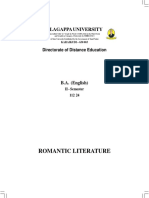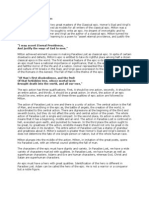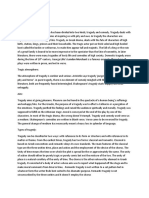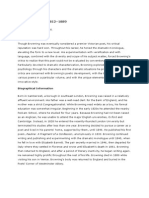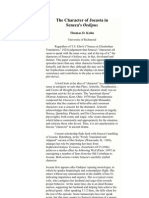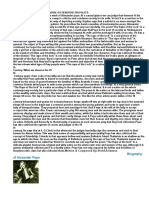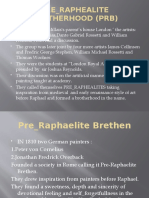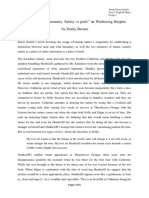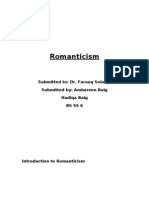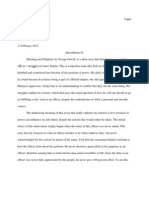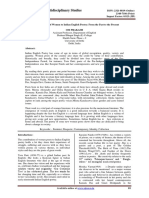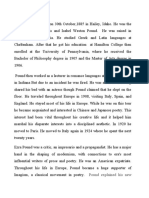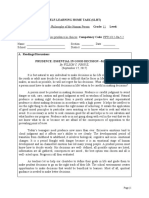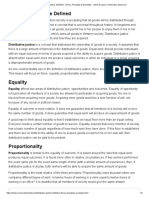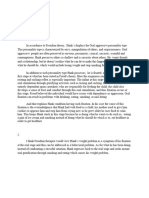Huck Finn
Huck Finn
Uploaded by
anon_59951004Copyright:
Available Formats
Huck Finn
Huck Finn
Uploaded by
anon_59951004Original Title
Copyright
Available Formats
Share this document
Did you find this document useful?
Is this content inappropriate?
Copyright:
Available Formats
Huck Finn
Huck Finn
Uploaded by
anon_59951004Copyright:
Available Formats
52
CHAPTER II
ON THE HORNS OF MORAL DILEMMA : HUCKLEBERRY FINN
According to Descartes there are two possible sources of knowledge – sense and
reason. Effective thinking and learning can happen only when both are involved.
The Adventures of Huckleberry Finn by Mark Twain was published in 1884 and it
was written as a companion to The Adventures of Tom Sawyer, the story of a vagrant boy
published in 1876. Mark Twain‘s literary career started quite early in his life with his
experiences on the river Mississippi and those involving his own village Missouri forming
the core. Twain‘s first story was a humourous one called Jumping Frog (1865) and it
marked the beginning of his long journey as a novelist. Most novelists at some point in
their career use memories of their past as materials for their fiction. Mark Twain has done
so in The Adventures of Huckleberry Finn. As a writer Twain was preoccupied with the
question of personal freedom. Huckleberry Finn is considered to have a personal link to
the author‘s life. Professor Lionel Trilling admirably sums up the book‘s appeal.
Certainly one element in the greatness of Huckleberry Finn is that it
succeeds first as a boy‘s book. One can read it at ten and then annually
ever after, the each year finds that it is as fresh as the year before, that it
has changed only in becoming somewhat larger. To read it young is like
planting a tree young – each year adds new growth ring of meaning and
the book is as little likely a tree to become dull … . (138-139)
Another critic of equal stature H.L. Mencken called it ―one of the great masterpieces
of the world‖ (qtd. in Messent 221). The Adventures of Huckleberry Finn is a picaresque
Please purchase PDF Split-Merge on www.verypdf.com to remove this watermark.
53
novel and the question arises as to how it can be categorized so since its location is
mostly the Mississippi. But critics consider the river as road. And Huck being the picaro,
undergoes a series of adventures. Trilling states that the novel is typically picaresque.
The form of the book is based on the simplest of all novel-forms, the
so-called picaresque novel, or novel of the road, which strings its incidents
on the line of the hero's travels. But, as Pascal says, ‗Rivers are roads that
move,‘ and the movement of the road in its own mysterious life transmutes
the primitive simplicity of the form: the road itself is the greatest character
in this novel of the road, and the hero's departures from the river and his
returns to it form a subtle and significant pattern. The linear simplicity of the
picaresque novel is further modified by the story's having a clear dramatic
organization; it has a beginning, middle, and an end, and a mounting
suspense of interest. (146-147)
Trilling emphasizes the presence of river as the ―greatest‖ character and implies
that the form has its primitive origins. The journey outward representing the inward
journey has been the archetype and such stories are prevalent in all the world cultures.
Trilling makes it clear how fundamental an experiential pattern is contained in Twain‘s
novel and by extension in man‘s attempt to make sense of life. It is a mode not simply
designed by writers but one that is probably embedded in our psyche and biology too, as
some of the latest trends in literary interpretation would have it.
William Faulkner in one of his interviews told that Mark Twain was the first truly
American Writer. The Adventures of Huckleberry Finn is a Bildungsroman novel with
Please purchase PDF Split-Merge on www.verypdf.com to remove this watermark.
54
forty three chapters noted for its simplicity and subtlety, directness and complexity that
have given the novel its popularity. ‗Novel‘ in Twain‘s opinion should deal with society.
It must not shift its readers to another world. Twain‘s Huckleberry Finn contains social
issues and problems of conscience. Egan says that
Twain‘s novel The Adventures of Huckleberry Finn can be considered
almost a dramatized casebook, a living study in geographic, political and
sociological actuality which when taken together yield a supremely fine
work of literary art. (73)
It is not a romance or legend, not a myth, but a representation of a reality seen in
its best aspect. Twain and Huck tell us a story involving incidents and characters that are
life like. Huckleberry Finn holds out the hope that human relations, including those crossing
racial boundaries, can be arranged consensually by individuals with some degree of
moral agency – they know right from wrong and can act on that knowledge (Crane 164).
Twain‘s novel is considered a book of morality of love and humanity. Though he
humourously states at the beginning of the novel that ―persons attempting to find a moral
in it will be banished,‖ (ix) the novel focuses on the moral sensitivity of Huck and demonstrates
how a change in one‘s way of seeing is intertwined with the change in one‘s way of living.
The connection between ways of seeing and ways of living makes possible the moral
transformation that characterizes Huck‘s progressing perception of Jim, as a slave first
and then as a friend. This moral conversion is much like the perceptual transformation Ludwig
Wittgenstein considers in his discussions of ―noticing an aspect,‖ in which a shift in what
one sees is connected to the background against which the perceptual object is seen and
Please purchase PDF Split-Merge on www.verypdf.com to remove this watermark.
55
to the ways in which one is prepared to respond to it. The novel does not argue as to why
we should see Jim as human nor does it narrate Huck‘s confrontations with moral
arguments. But his interactions with Jim make him understand Jim‘s humanity and
friendship which in turn shows the possibility of a moral transformation not determined
by rules or philosophical arguments (Crocker 58).
The book has three sections narrated by the thirteen year old protagonist Huckleberry
Finn. The first section deals with Huck‘s life with Miss Watson and Widow Douglas and
their attempts to civilize Huck. In the second section, Huck runs away and finds himself
in the company of a slave, Jim. In the last section, Huck returns to civilization and lives
with Tom in Uncle Silas‘ farm. The whole story revolves around Huck from his resisting
the influence of civilization in the beginning to his accepting to go with Aunt Sally at the
end of the novel. Huckleberry Finn is presented as a person with self-consciousness.
Throughout the novel Huck is aware of his own self and his desires, about the evils of the
society and often reveals his disgust for the civilized world. Huck, being alone without a
family, feels lonely often and mostly he has to struggle within himself – with his conscience.
Conscience is an important factor in Huck‘s growth. Conscience can be explained as the
ability to participate in the social world by balancing one‘s needs and desires with those
of others (http://www.faqs.org). Huck in order to help Jim has a tough time with his conscience
throughout the novel. It is a struggle between Huck‘s ego (the sense of who he is that results
from his being a member of the White society) and his superego (awareness of right and
wrong). Moral development, according to Freud, occurs
Please purchase PDF Split-Merge on www.verypdf.com to remove this watermark.
56
… where the idea of conscience (in the superego) embodies the
internalized dual nature of instincts or drives in clash with a sense of
obligation to control those drives by adhering to societal standards. (qtd. in
Killen and Smetana 13)
Huck‘s societal conscience, which Twain calls ―deformed conscience,‖ conflicts
with his natural sympathetic nature. But Huck stands by his own morality and helps Jim
escape slavery. Huck has emotional stability, self regulation and empathy which make
him, in Freudian terms, a person with good ego strength. A person with good ego strength
can manage pressures caused by the conflict between id and superego.
The novel in spite of receiving negative criticism was soon acclaimed as an American
Classic. One of the best compliments comes from none other than Ernest Hemingway.
… all modern American literature comes from one book by Mark Twain
called Huckleberry Finn . ... It‘s the best book we‘ve had. All American
writing comes from that. There was nothing before. There has been
nothing as good since. (29)
Hemingway gives the novel the status of a pioneering forerunner. He considers it
a work that created the American identity. It may be said that Twain‘s role in American
literature is identical to that of Shakespeare‘s in British Literature. Adventure and moral
scrutiny have constituted most of American fiction and it is no tough guess as to where it
comes from.
In the first chapter of the novel Huck introduces himself with an element of
familiarity. The novel is wholly about Huck‘s mixed response towards and qualms of
Please purchase PDF Split-Merge on www.verypdf.com to remove this watermark.
57
conscience about slavery and the resultant moral development. Huck‘s perception of Jim
as a slave changes to considering him as a human being aspiring to be free, full of love
and care for his family and Huck and later loyalty to Tom.
As the novel opens we find Huck in Watson‘s home. He does not like to be
civilized and he listens only partly to Miss Watson. The initial chapters clearly establish
Huck‘s dislike of the existing societal rules. Huck is not interested in the teachings of
Widow Douglas and Miss Watson and feels lonesome in the Widow‘s house. Miss Watson‘s
moral and social admonishments leave Huck alienated and isolated. Huck‘s direct conflict is
with books and with the conventional religion which Miss Watson tries to force on him.
There exists a contrast between her volubility and Huck‘s increasing reticence. Under the
protection of civilization, Huck‘s mind is disturbed which prompts him to perceive the
external world as his companion. He sees it as a reflection of his own life and mind.
The stars was shining, and the leaves rustled in the woods ever so
mournful; and I heard an owl, away off, who-whooing about somebody
that was dead.. . and a dog crying about somebody that was going to die....
Then away out in the woods I heard that kind of a sound that a ghost
makes when it wants to tell about something that's on its mind and can't
make itself understood, and so can't rest easy in its grave and has to go about
that way every night grieving ... the house was all as still as death. (4-5)
Huck does not romanticize the external world. The novel being an exercise in
realism, Huck is shown as a person alive to the dangers and perils of the external world.
Please purchase PDF Split-Merge on www.verypdf.com to remove this watermark.
58
Huck makes an interesting contrast. The external world depicted here is not exactly friendly
but there are sights, sounds and movement. It is alive, whereas the house is ―as still as
death.‖ Hence, Huck‘s decision to ―light out‖ is a meaningful one.
Huck‘s first call to adventure involves getting away from Widow Douglas and
Miss Watson. In fact, it is the unthinking morality and culture offered by Widow Douglas
and Miss Watson that has made him averse to civilization. But for the pair‘s idea of ―civilizing‖
Huck‘s adventure will lose its relevance. So, if he moves back to the town he has to suffer
―education‖ and also chances are there for Pap (Huck‘s father) to find and murder him for
the sake of money. However, Pap does find Huck and abducts him. Using a ruse, Huck
makes Pap believe he is dead and escapes.
Huck goes away because he desires adventure and in addition it would also help
him escape civilization. At this point, Huck is on his way to begin his journey of self
discovery. It is only during this journey on the Mississippi river that Huck learns about
life. The decision to save Jim is born out of the moral nature of Huck. Huck‘s mind and
heart house moral values. The journey on the river forms the entire novel. There are two
stages in the call to adventure – getting away from the Widow‘s house and escaping from
Pap. The actual adventure begins only after his escape. His escape symbolizes his separation
from society and civilization. Consequent on his escape, Huck finds himself on the river
in the company of Jim. Now, Huck must have his adventure which will offer him lessons
in living, knowing and making his self. He will earn his education and civilization rather
than accepting and receiving the readymade, cornball civilization offered by the society.
Please purchase PDF Split-Merge on www.verypdf.com to remove this watermark.
59
The learning process in Huck is activated by the adventures Huck undergoes in
the company of Jim during their journey on the Mississippi river. Accosted by guilt
though, Huck never fails to save Jim from being caught. Each time it is an instance of
acute moral crisis for Huck as he is equally disturbed about going against the edicts of his
society by helping Jim. In every such tussle his innate humanity wins. Huck comes across
only fraud and hatred beyond the banks of the river.
The first six chapters of the novel present the background of the novel – the
village life, characters and relationships – which creates the central mood. Huck‘s initial
conversations with Widow Douglas clearly show that in him there is a conflict between
civilization and freedom. Huck‘s boyish innocence comes into direct conflict with the so
called civilized world. Widow Douglas adopts Huck and she wants to bring him up as a
civilized person. But being a child of nature Huck has little interest in it. He is as free as
the elements of nature and is naturally disturbed at the mechanical regularity and rigid
puritanical discipline that governed Widow Douglas‘ household. Fed up with her
―civilizing‖ efforts Huck says:
The Widow Douglas she took me for her son, and allowed she would
sivilize me; but it was rough living in the house all the time, considering
how dismal regular and decent the widow was in all her ways; and so
when I couldn't stand it no longer I lit out. I got into my old rags and my
sugar-hogshead again, and was free and satisfied. (2)
Huck is not a person who can abide by rules. Huck is forced to change his natural
character. He is dressed up in new starched clothes and is instructed that he eat only after
Please purchase PDF Split-Merge on www.verypdf.com to remove this watermark.
60
the dinner bell. By showing Huck‘s aversion to all this Twain supports Rousseau‘s view
that civilization corrupts rather than develop people (http://www.quebecoislibre.org).
Also, Widow Douglas lectures Huck on the importance of prayer. But Huck has not any
deep belief in God and prayers. Huck is told to pray for what he wants. Huck does but
gets nothing. This makes him decide praying is pointless. Huck also reflects on the Christian
concept of helping other people. He becomes a pragmatist in rejecting the Christian view as it
offers him no personal advantage in life. Exposed to all these situations Huck feels
baffled, sick and lonely. When alone in his room he says:
Then I set down in a chair by the window and tried to think of something
cheerful, but it warn't no use. I felt so lonesome I most wished I was dead. (4)
This shows that received civilization, concept of religion and praying lead only to
skepticism. Huck is rational though he allows superstitions to worry him. He is not much
attached to Pap or Widow Douglas. The future sufferings of Huck are foreshadowed by
various ill omens. After burning the spider in the candle flame Huck is afraid that some
disaster may befall him. Huck‘s responses to ill omens bring out his worries about his future.
When Miss Watson describes to Huck heaven and hell, he wants to go to hell. But he does
not reveal his thought to Watson because he knows it would annoy her. Huck has the
same feeling (going to hell) when he decides to help Jim which is against the societal
laws. Huck has no close relationship with his father Pap who is a drunkard and can stoop
to the level of killing his own son for the sake of his money. Huck is very much afraid of
Pap. He is shocked to see the shoe print with a cross mark and suspects the presence of
Please purchase PDF Split-Merge on www.verypdf.com to remove this watermark.
61
Pap in the town. In order to know whether Pap will find him he seeks the help of Jim.
Using his hairball oracle Jim predicts the future of Huck. He tells that there are two
angels flying around him – one light and the other dark.
You gwyne to have considerable trouble in yo‘ life, en considerable joy.
Sometimes you gwyne to git hurt, en sometimes you gwyne to git sick; but
every time you‘s gwyne to git well agin. Dey‘s two gals flyin‘ ‗bout you
in yo‘ life. One uv ‗em‘s light en t‘other one is dark. One is rich en t‘other
is po‘. You‘s gwyne to marry de po‘ one fust en de rich one by en by. You
wants to keep ‗way fum de water as much as you kin, en don‘t run no resk,
‗kase it‘s down in de bills dat you‘s gwyne to git hung. (23)
Jim does predict right the struggles and conflicts Huck must face. Symbolically, it
could refer to the compelling forces within the person of Huck. The conditioning of the
white society and an inherent morality are at war within Huck. But in spite of fears and
feelings of guilt, Huck always manages to act from his basic, essential humanity. Alert
and sensitive to situations, Huck strikes us as a boy of vibrant nature. Huck fights for his
own life and not less for the life of Jim.
Huck was pushed out of his comfort zone when abducted by Pap. Though averse
to the ways of the civilized society, Huck did attempt to adjust to it. But once brought out
of that life he decides not to return to Widow Douglas for two reasons – first, he cannot
get himself to like that life and second he wants to be free from rules and civilized life.
Huck feels that he is now free to smoke, be dirty with nothing to do. In the beginning,
Huck appears as an innocent boy with Tom as his only companion. Then the inexorable
Please purchase PDF Split-Merge on www.verypdf.com to remove this watermark.
62
forces of life start acting on his destiny. He had to leave Widow Douglas and when cruelly
treated by Pap that life too had to be cast aside. The suicide that he stage-manages is a
symbolic representation of his final break from society. Huck reaches Jacksons Island
though it is not his destination and it is evident that it will serve as a base for his upcoming
journey. Huck prefers a freer space and a separate peace and is psychologically ready to
take risks rather than compromising for the existing but restricted freedom.
The novel at the deepest level explores the possibility of creative independence
within the confines of human society and personal freedom. Huck is caught between stern
rebuke and enforced social acceptance. Caught on the horns of this dilemma there is
nevertheless a strong undercurrent of self-affirmation. Huck is filled with self-recrimination
and self-condemnation but he is never self loathing. Huck strives for self identity and
freedom. He is a rural boy resisting civilization with extreme moral sense. He takes the
highest responsibility of freeing Jim, and in the process takes risks and faces many a
testing situation. Huck is caught in the conflict between relieving Jim from slavery and
normative behaviour expected of him by his society. Saving a slave was considered then
a sin and Huck breaks a social norm by helping Jim. He knows that it is a difficult job but
nevertheless decides to help Jim escape. There are situations in the novel where Huck
wrestles with his conscience.
I was trying to make my mouth say I would do the right thing and the
clean thing, and go and write to that nigger's owner and tell where he was;
but deep down in me I knowed it was a lie, and He knowed it. You can't
pray a lie – I found that out. (272)
Please purchase PDF Split-Merge on www.verypdf.com to remove this watermark.
63
Huck is a classic instance of the struggle between the head and the heart. The
heart wins and having decided to save Jim, Huck says:
And for a starter I would go to work and steal Jim out of slavery again;
and if I could think up anything worse, I would do that, too; because as
long as I was in, and in for good, I might as well go the whole hog. (273)
Huck is not only morally sensitive but willing to take positive action on such
sentiments. And more, he is willing to take responsibility for his action.
Huck undergoes many adventures that help him emerge as a self-reliant and mature
person without school and formal education. Huck uses his own logic and knowledge to
analyse things rather than blindly following precepts. Huck‘s journey on the Mississippi
is considered an odyssey and pilgrimage having a moral purpose. Huck takes the role of
the protector to Jim and saves him in all the life threatening situations encountered on the
journey down the Mississippi river. The journey is a life changing experience for Huck
leading to his emotional and personal growth with Jim as his conscience keeper.
The novel is comical and adventurous but is also a severe criticism against civilization
and its traditions. From the latter point of view, Huck can be viewed as embodying the
principle of anarchic rebellion. This is hinted at the beginning of the novel itself.
I reckon I got to light out for the Territory ahead of the rest, because Aunt
Sally she‘s going to adopt me and sivilize me and I can‘t stand it. I been
there before. (372)
Huck is compassionate towards Jim and considers him very much a part of humanity.
Jim is a loyal and dependable friend. Huck freeing Jim is also an advantage to Huck for,
Please purchase PDF Split-Merge on www.verypdf.com to remove this watermark.
64
it is his rebellious act that frees him from civilization and constricted town life. In their
freedom run, both Jim and Huck undergo changes. Jim‘s trust in Huck keeps increasing
as the novel progresses. Jim even shares his hopes and desires with Huck.
Huck tries to find purpose and identity amidst conflicting moral positions. He
initiates the journey in search of his identity and maturity. Life itself is considered a
journey full of bonding and experiences which lead to wisdom and understanding. Huck
spends much of his time on the Mississippi river where he learns a lot through his experiences
with different kinds of people and diverse situations. When Huck runs into the bounty
hunters he is forced to make a decision whether he must choose to help Jim or leave him.
Fortunately, his will is strong and he fabricates an elaborate lie to prevent Jim from being
captured. Being a rural boy, Huck seeks refuge in nature where questions of right and
wrong do not arise and what matters is life's beauty rather than societal laws. Huck is in
the world of nature except in the beginning of the novel. Being so, his experiences are
totally dependent on nature. Jim is the sole companion to Huck on the Mississippi river.
In novels of character, childhood memories usually are a source of strength, but Huck has
no such memories to cherish.
Huck resists being civilized because he finds only cruelty, greed and violence in
the civilized society. In fact, the conflict between ―civilization‖ and ―natural life‖ is
considered to be one of the crucial themes of the novel. The conflict in Huck relates to
the ethical question of what is right and what is wrong. Every individual has the right to
know the truth and act accordingly. Huck‘s behaviour and attitude in the opening chapter
can be interpreted as what Kohlberg describes as the first stage in moral development –
simple deference to a superior force or authority. Pre-conventional is the earliest and the
Please purchase PDF Split-Merge on www.verypdf.com to remove this watermark.
65
least mature form of moral reasoning (http://pegasus.cc.ucf.edu). It is at this stage of
morality that Huck feels that Miss Watson is the rightful owner of Jim. At this stage,
Huck does not think about the right and the wrong. In spite of threats and fears faced by
him Huck creates his own integrity. His autonomy develops as he learns to sustain his
opinion of helping Jim. Huck reaches the final stage of Kohlberg‘s post-conventional
morality as he dares to go against the societal laws to protect human rights. Huck is
innately sympathetic and this nature keeps improving. This nature of his can be better
understood if we apply Kohlberg‘s idea of the interconnectedness of justice and sympathy.
According to him, ―our role-taking tendencies and our fundamental sense of justice are
deeply interwoven and, as such, are closely related to the experience of sympathy and the
desire to resolve conflict‖ (qtd. in Salkind 461). In Huck we come across all these features.
He does take roles, deliberate on the right and the wrong, show sympathy and also evince
desire to resolve conflict.
The influence of adults that Huck meets during his childhood is of crucial importance
and they act as essential factors for Huck to emerge as a mature person though he does
not approve of their designs on them. His activities and motives have been like those of
an adult. Pap indirectly taught him to be self-sufficient, Widow Douglas educated him to
become "sivilized" and Jim gave him lessons in humanity. All these aid in making him a
Bildungsroman hero – a morally educated person. Huck‘s cognitive development can be
interpreted based on Vygotsky‘s theory. Vygotsky proposed social constructivism theory
and he believed that learning and development are a collaborative activity
(http://www.fountainmagazine.com). Though Huck learns from his elders he mostly
allows his own logic and sense of justice to take over in determining what is good and
Please purchase PDF Split-Merge on www.verypdf.com to remove this watermark.
66
what is bad, rather than blindly adopting others‘ ideas. Huck forms ideas about the world
and society on his own but his real growth happens during his journey and interaction
with Jim, an adult and a kind of father figure. Huck‘s commonsense and naive literalism
combine with his natural perceptiveness to enable him observe the stupidity and
hollowness in the so called civilized life. This perceptiveness is the most significant and
unique characteristic in Huck.
Only in the later chapters of the novel do we find Huck to be a loving and caring
friend and protector to Jim. Huck does not believe in God but is afraid of ill omens. Huck
joins Tom‘s gang to rid himself of this fear but there too he is disenchanted. Soon he
comes to know that Tom‘s adventures are fabricated and false. They are just make believes
that Huck‘s conscience inevitably loathes. Though Huck is filled with feelings of loneliness it
does not affect his interpersonal skills. He has certain qualities of imagination, sympathy and
sensitivity. Huck escapes from Pap by killing a pig and dragging it bleeding to the river
so that Pap would think that he was dead which exhibits his imaginative skill and strategic
thinking. He plans so well as to leave no scope for suspicion. His disguise as a girl and
use of false identity at the Grangerfords show how creatively he wriggles out of difficult
situations. He is an adept at cooking up white lies to save his skin. He can also manage
affairs effectively for Jim and ensure his safety. Huck has the maturity to see through the
mask of the king and the duke and understand their crooked minds. Looking at the way
Huck handles difficult situations it can be argued that he has reached what Vygotsky calls
the―zone of proximal development.‖ He sets out to face the world and emerges a winner with
the help of Jim. Vygotsky maintains that at any age the child‘s potential for understanding and
problem solving is not equal to his actual understanding and problem solving ability.
Please purchase PDF Split-Merge on www.verypdf.com to remove this watermark.
67
Potential ability is always greater than actual ability: the zone of proximal development
refers to the range of possibilities that exist between the actual and the potential. Structured
social interaction or scaffolding and internalization are the processes that gradually allow
the potential (for understanding and problem solving) to become the actual (concepts and
skills) (http://books.google.co.in, Educational Psychology). The increasing ease with which
Huck manages difficult, demanding situations indicates that Huck, in Vygotsky‘s terms,
is narrowing the gap between his potential ability and actual ability. This is achieved by
Huck as he excels in interactional space. He is also a gifted empathizer and hence
internalisation of others‘ mental states, moods, thoughts etc. comes naturally to him.
Huck feels a sense of kinship with nature. Sensitive to the workings of nature he
in a way communes with it. Lying on his back in the canoe on the river, he says: ―The sky
looks ever so deep when you lay down on your back in the moonshine; I never knowed it
before. And how far a body can hear on the water such nights!‖ (44). Another example is
his description of the storm. Huck is at ease in the company of nature and therefore his
mind and heart are finally tuned to the natural environment. His eyes never miss the details of
nature. He takes lessons from nature and constructs his knowledge about people and life.
Nature provides Huck knowledge about the two extreme characteristics of people – calmness
(calm night) and ferocity (storm). It is only when he is with nature that Huck learns about
himself and his inner voice. In fact, Huck acts as a transcendentalist when he is with
nature giving much importance to self examination and individualism. He explores the
beauty of nature and of the human kind.
Many difficult situations await Jim after he leaves Pap. There are lots of hurdles to
overcome. Though Huck and Jim want freedom there is a difference in motive. Jim runs away
Please purchase PDF Split-Merge on www.verypdf.com to remove this watermark.
68
to escape slavery but Huck does so to avoid being caught in civilization which for him
symbolizes falsity and insincerity. The freedom Jim wants is physical and political
whereas Huck seeks the freedom to be himself. He is innocent and possesses an instinctive
sense of right and wrong. His code of morality is contradictory to that of the adults. Huck
cannot reconcile himself either to the world of Widow Douglas or to the adventurous
world of Tom.
Once Huck reaches Jackson‘s Island he feels that it is his own. His attitude is
revealed when he says: ―I was the boss of it; it all belonged to me so to say‖ (50). Away
from Pap and Widow Douglas, Huck feels at home amidst nature. During his journey
Huck has to assume various disguises to save Jim and himself. Huck had earlier subjected
himself to symbolic death to mislead Pap into assuming Huck‘s death. Though Huck fits
the term ―runaway kid,‖ rarely does he conduct himself as one. Autonomous functioning
comes naturally to him as evidenced in his use of disguises to solve the problems encountered.
After every disguise we see Huck emerge with a fresh dimension of personality and as a
more experienced person. Loyal to Jim, Huck assures that he will not reveal his identity
to anyone. This assurance is what instills confidence in Jim. Till the end of the novel
Huck keeps his promise he has made to Jim.
Well, I did. I said I wouldn't, and I'll stick to it. Honest INJUN, I will.
People would call me a low-down Abolitionist and despise me for keeping
mum—but that don't make no difference. I ain't a-going to tell, and I ain't
a-going back there, anyways. So, now, le's know all about it. (55)
Please purchase PDF Split-Merge on www.verypdf.com to remove this watermark.
69
The blossoming relationship between Huck and Jim during the journey down the
Mississippi is the central theme of the novel.
Huck and Jim are unaware of the happenings in the town and so Huck decides to
go to the town to acquaint himself with the news. Jim advises Huck to go disguised as a girl.
Jim also helps him wear the costume they collected from the floating house. He stops at a
house where he sees a woman knitting. Since she is new to the town, Huck figures that he
can talk to her without being recognized. When the lady inquires Huck he tells her that
his name is Sara Williams. Huck enquires about the area. Testing his patience, the woman
talks for over an hour about her problems. She finally gets to the news about Jim and
Huck and tells him that there is a three hundred dollar bounty for capturing Jim. Apparently,
some of the townspeople believe that Jim killed Huck and ran away, while others believe
that it was Pap who killed Huck. She adds that she believes Jim is hiding out in Jackson's
Island. Huck becomes nervous at hearing this. Conducting himself as a girl is no easy
task and Huck falters – he is poor in threading the needle, throws a piece of lead at a rat
and he claps the laps instead of throwing the knees apart to catch things. The inquisitive
lady asks his name again and Huck says it is Sara Mary Williams. Unable to withstand
the persistent questioning by the lady, Huck invents a new story. He says he is George
Peters an orphan sent to work at a farmer‘s home. He adds that because of the ill treatment
meted out to him, he ran away from that place. In the process he had to steal the clothes
of the farmer‘s daughter. He convinces her that he has come to this town in the hope of
finding his uncle who he hopes will help him.
The next time we see Huck at his fiction-making best, he is with the Grangerfords.
There is a feud between the Grangerfords and the Sheperdsons. The Grangerfords first
Please purchase PDF Split-Merge on www.verypdf.com to remove this watermark.
70
suspect Huck to be a person from Sheperdsons‘ side. But when they realize it is not so,
they welcome and treat him well. Huck tells the family that he is an orphan named George
Jackson from down south and that he arrived at their home after falling off a steamboat.
The Grangerfords ask him to stay with them and Huck agrees. The youngest of the
Grangerfords, Buck, is near to Huck's age and they soon become good friends. Huck
succeeds in convincing them of the fabricated story. Though Huck‘s disguise as a girl
failed earlier he had elicited the information he needed. His skills of imagination come to
the fore yet again. Huck demonstrates in this instance the cognitive ability to relate to an
earlier experience and use the resultant perception to manage the experience at hand.
Emerging victorious in such missions gives Huck confidence in his ability to move down
the Mississippi and face difficulties with courage. The second time Huck invents a name
for himself, he reminds himself of his earlier mistake and is very careful now.
It is only after spending time with Jim, Huck understands the value of being humane.
A number of critics claim that Jim is the only adult in the book and the only one who
provides a positive example for Huck to follow. When a storm forces a steam boat to ram
into their raft both of them dive into the river to save their lives. When Huck comes out
almost half dead his first concern is Jim and he makes all possible efforts to find Jim: ―I
sung out for Jim about a dozen times, but I didn't get any answer‖ (120). Since there is no
response to his shouts, he assumes Jim dead. After this incident, Huck is left alone for
sometime. Jim is alive and soon they are rejoined. The journey continues. It is pertinent
to note here the anxiety Huck feels in the absence of Jim, the companion in his experiential
Please purchase PDF Split-Merge on www.verypdf.com to remove this watermark.
71
journey. Huck cannot think of continuing the journey without Jim. Huck‘s innate humanity is
yet again demonstrated by the concern he has for Jim immediately after surfacing from
the depth of the river.
Half way through the journey, Jim feels happy that they would reach Cairo soon
and be free. Jim tells Huck that once he reaches the free state he would earn money to get
back his wife and after that both will work hard to get back their children. He adds that if
the owner refuses to let free their children he would seek the help of the abolitionists to
bring back his children. Though Huck‘s heart is for Jim going free, he is disturbed by the
words of Jim. ―It most froze me to hear such talk. He wouldn‘t ever dared to talk such
talk in his life before. Just see what a difference it made in him the minute he judged he
was about free‖ (112). His duty to the opinion of his society rears again and his mind is
filled with fear. Jim has the necessity of reinventing his self by embarking on a search for
a new identity. Deprived of the basic human status, he often does not know who or where
he is. ― ‗Say, who is you? Whar is you‘ ‖ (6). But Jim has managed to survive depending
on his instincts. Both Huck and Jim find partial answers to these questions at the end of
the novel.
Huck again has an argument with his conscience as thoughts of impropriety of
helping Jim escape resurface. Huck is almost convinced now that letting free a ―nigger‖
is wrong and decides to hand over Jim and the thought makes him feel relieved. Each
time Jim mentions he will be free soon, the dilemma returns to Huck who is torn ethically
and emotionally. Not sure of his decision to expose Jim, Huck saves Jim again from the
men who approach the raft. He avoids a search of the raft by inventing this time a small pox
victim. Huck has been the only instrument in Jim‘s escape. Though caught in conflicting
Please purchase PDF Split-Merge on www.verypdf.com to remove this watermark.
72
thoughts, Huck is able to empathically understand the hopes and fears, goals and plans
and desire for freedom in Jim. Helping Jim escape is breaking the law, but turning him in
is against the law of his heart. Thus, Huck is trapped in a difficult moral dilemma.
Disturbed by Jim‘s expression of his aspirations Huck has decided to report Jim.
My conscience got to stirring me up hotter than ever, until at last I says to
it, ‗Let up on me—it ain't too late yet—I'll paddle ashore at the first light
and tell.‘ (113)
Professor Edgar M. Branch explains Huck‘s condition as ―the conflict between
individual freedom and the restraints imposed by convention and force; or, within Huck's
consciousness, the struggle between his intuitive morality and his conventional conscience‖
(188). The ethical conflict here is not one where the right and the wrong can be calculated
and thought out. It is rooted in the being of Huck. He is caught between the constructed
morality of the society and an organismic, intuitive morality enabled by his internalization of
Jim‘s longing for freedom. Jim, unaware of the conflict in Huck‘s mind, is so happy and
expresses his happiness and gratitude to him: ―…de ole true Huck; de on'y white genlman
dat ever kep' his promise to ole Jim‖ (114). Huck is different from other white men Jim
has come across. Jim loves Huck for his lack of malice, goodwill, companionship and
concern. Jim begins to trust Huck both as a confidant and as a comrade in their journey
towards freedom. Shaking off thoughts of societal obligation, Huck decides to save Jim
from being caught. This incident offers us a window onto the mind of Huck whose head
and heart have been at war with each other. At the end, Huck picks up the courage to
stand by the evolved-inside morality of his. Huck‘s experience exhorts that each one
Please purchase PDF Split-Merge on www.verypdf.com to remove this watermark.
73
must find morality that is the outcome of one‘s being. Conformity to conventional morality is
no value. Huck exists and adventures into life only to grow more humane and mature in
his thoughts. Huck also exhibits attributes of self-efficacy. Daniel W. Cox quotes Albert
Bandura‘s definition of self-efficacy: ―an individual‘s belief in their ability to accomplish
certain goals. This belief stems from various sources and is domain specific, meaning that
a person has efficacy beliefs regarding a specific task in a given situation and does not
necessarily generalize those efficacy beliefs to other situations. Self-efficacy develops in
people throughout their lives, and their past situations influence their current and future
efficacy beliefs‖ (157). Belief in the ability to accomplish goals is abundant in Huck as
evidenced by the success of his stratagems in many situations. Huck has ―context-sensitivity‖
which allows him to reject conventional morality and save Jim. It should also be seen that
Huck‘s decisions are the outcome of both conscious deliberation and intuitive assessment.
We run into the humanity of Huck again while he stays with the Grangerfords. He
comes to know about the feud between the two families. Huck finds that both the families
carry guns when they go to pray at the church where brotherly love is preached. Huck
immediately understands the irony and incongruity of this situation. Huck and Jim get
separated in the feud between the Grangerfords and Sheperdsons. Huck exclaims on
being reunited with Jim: ―It was Jim‘s voice – nothing ever sounded so good before‖
(147). Huck delights in the voice of friendship and trust. Jim‘s voice has given hope and
relief to Huck. It also shows how accustomed Huck has grown to Jim‘s presence and the
mentoring role played by the latter in the experiential development of the former.
During his stay with the Grangerfords Huck grows very fond of Buck. As with
Jim, Huck develops emotional ties with Buck whose death comes as a rude shock.
Please purchase PDF Split-Merge on www.verypdf.com to remove this watermark.
74
When I got down out of the tree, I crept along down the river bank a piece,
and found the two bodies laying in the edge of the water, and tugged at
them till I got them ashore; then I covered up their faces and got away as
quick as I could. I cried a little when I was covering up Buck‘s face, for he
was mighty good to me. (147)
The senseless killing indulged in by the Grangerfords and the Shepherdsons
prompt Huck question the so called civilized ways that have only perpetuated a feud. It is
certain misplaced notions of honour that have been responsible for the death of someone
wonderful like Buck. Huck is upset and annoyed in a profound sense at the meaningless
waste caused by ideas of civilization. As a result of this incident, Huck‘s mind takes a
philosophical turn.
Huck is faced with the moral predicament of slavery throughout the novel. This
theme runs through the novel. Torn between his obligation to his society and his innate
conscience, Huck is morally so confused that he almost turns Jim in during their journey
on the river. Huck checks himself in time. But in the end, Jim is captured and Huck decides
to free Jim by helping him break out of the confinement. In a sense, Huck passes his
supreme test by doing what he feels is morally right. Huck understands Jim‘s emotions
and tries to help him accomplish his goal. This quality of Huck makes him and Jim better
companions. ―[T]o see things from the other person‘s point of view‖ (Carnegie 175) and
to ―talk in terms of the other person‘s interests‖ (ibid 98) are the essential attributes of a
developing person. Epley and Waytz cite Brewer, (1979), Byrne, (1971), Tajfel, (1981)
to prove how an increase in shared interests increases social connection and liking. They
also refer to the findings of Galinsky, Ku, & Wang, (2005), Sinclair, Huntsinger, Skorinko, &
Please purchase PDF Split-Merge on www.verypdf.com to remove this watermark.
75
Hardin, (2005) who maintain that considering another‘s goals, intentions, emotions, and
beliefs can lead people to identify those who are likely to be good targets for affiliation
and to tune their behavior so that it is consistent with a target‘s presumed beliefs to increase
similarity and connection (502-503). All these qualities are seen in Huck. His ability to
perceive another‘s mind improves his social and interpersonal relationships. Using his
perceptiveness Huck eliminates the gap between the self and the other, a feat not possible
for the Grangerfords and the Sheperdsons supposed to be representatives of civilization.
Another episode which brings out Huck‘s innate moral sense is where he helps
Peter Wilks‘ daughters get back their property from the king and the duke. Aware of the
plan of the crooks, Huck recovers the money from them and keeps it in the coffin of Peter
Wilks. Huck decides to reveal this to the elder sister Mary Jane but here again he faces a
dilemma. Though the crooks deserve to be caught, Huck feels that it would be like betraying
them. Disclosure of the truth will result in them getting caught. It is significant that Huck‘s
immediate response is compassionate rather than ethically appropriate. But he chooses
the right thing and decides to reveal the truth as it would benefit the blacks as well. This
incident marks further development in Huck as it shows his reflective thinking skills in the
moral domain. There is also a twist here. He has till this point managed situations and solved
problems with his fabricated white lies. But this time he does so by telling the truth.
I see I had spoke too sudden and said too much, and was in a close place. I
asked her to let me think a minute; and she set there, very impatient and
excited and handsome, but looking kind of happy and eased up, like a
person that's had a tooth pulled out. So I went to studying it out. I says to
myself, I reckon a body that ups and tells the truth when he is in a tight
Please purchase PDF Split-Merge on www.verypdf.com to remove this watermark.
76
place is taking considerable many resks, though I ain't had no experience,
and can't say for certain; but it looks so to me, anyway; and yet here's a
case where I'm blest if it don't look to me like the truth is better and actuly
SAFER than a lie. I must lay it by in my mind, and think it over some time
or other, it's so kind of strange and unregular. I never see nothing like it.
Well, I says to myself at last, I'm a-going to chance it; I'll up and tell the
truth this time, though it does seem most like setting down on a kag of
powder and touching it off just to see where you'll go to. (238)
Huck himself accepts that lies have been better options so far to extricate himself
from tight situations. He has not had any reservation or apprehension about lying in
earlier instances. Initially, out of compassion for the king and the duke, Huck thinks of
handling the situation in his usual manner. But his ―sensitivity to context‖ and ―cognitive
alertness‖ enable him to read the situation and take an appropriate decision. It should also
be noted that in making decisions Huck brings both his head and heart to have a bearing.
We also can see Huck‘s altruistic nature for, he tells the truth to Jane at a risk to his life.
The fraudulent duo are dangerous and vindictive too. Huck helps the sisters for their
kindness. This incident marks further maturity in Huck. This is yet another instance
where Huck acts according to his heart-led conscience.
It is known later that Jim has been sold to the Phelps by the king. Huck somehow
wants to save Jim from getting into slavery again. First Huck thinks of making Miss Watson
aware of the presence of Jim. But the reflective thinker that he has become, he prospects
the consequences. In such an event, both Huck and Jim will be subject to negative reputation
and no one will trust them. Huck will be ostracized for aiding the get-away of a ―nigger‖
Please purchase PDF Split-Merge on www.verypdf.com to remove this watermark.
77
and condemned for breaking a social norm. Jim will be charged with breaking the law
and ingratitude. Weighing the options, Huck drops the idea. Huck is visited by the earlier
reservations about helping a slave. The conflict between social norms and individual
consciousness reemerges.
I most dropped in my tracks I was so scared. Well, I tried the best I could
to kinder soften it up somehow for myself by saying I was brung up
wicked, and so I warn't so much to blame; but something inside of me kept
saying, ‗There was the Sunday-school, you could a gone to it; and if you'd
a done it they'd a learnt you there that people that acts as I'd been acting
about that nigger goes to everlasting fire.‘ (270)
Huck must undergo the crisis to recover his resolve to help Jim. Intuitive conviction
recedes and boy fears return.
Huck has been skeptical about God from the beginning. Miss Watson‘s exhortations
only made him tired of praying. He had no use for a God who did not give material gifts.
Widow Douglas‘ promise of ―spiritual gifts‖ (14) did not interest him. But reminded of
Widow Douglas‘ teachings Huck is now frightened that God is watching all his activities
and will punish him. So, he resolves to pray for forgiveness but he cannot do it. Then he
decides to write a letter to Miss Watson and pray thereafter. The letter is written and before
starting to pray he rethinks about the letter. He tries to pray again, but cannot as his innate
conscience intervenes. He has been the one who has saved Jim in all the difficult situations
when they travelled down the river. Huck realizes the goodness of the original motive to
help Jim whose love for him is genuine and true. He also thinks of the feelings of gratitude
Please purchase PDF Split-Merge on www.verypdf.com to remove this watermark.
78
that Jim entertains towards Huck. Intuitive morality takes over and Huck tears the letter
and decides to save Jim come what may. He is even ready to go to hell for the sake of his
own sense of right which is conflicting with the norms of society. This is a moment when
Huck finally resolves his great moral and emotional struggle. Huck‘s declaration that he
would even ―go to hell‖ in order to set Jim free is an example of a moral imperative emerging
from friendship (Crane 158). As long as Huck and Jim remain on the raft, separated from a
political and social context animated by racism and power, their connection can be governed
by an interracial moral consensus rather than force. In Huck‘s case, moral inspiration
does not come in the form of the clear cut obligations arising from social convention or
divine instruction, but rather emerges from reflection, internal debate, and conversation.
(http://www.fountainmagazine.com)
It was a close place. I took it up, and held it in my hand. I was a- trembling,
because I'd got to decide, forever, betwixt two things, and I knowed it. I
studied a minute, sort of holding my breath, and then says to myself: "All right,
then, I'll GO to hell"—and tore it up. It was awful thoughts and awful words,
but they was said. And I let them stay said; and never thought no more about
reforming. I shoved the whole thing out of my head, and said I would take
up wickedness again, which was in my line, being brung up to it, and the
other warn't. (273)
This passage is an instance of intrapersonal interaction and communication. The
conversation Huck has with himself also underlines the growing perceptival process in him.
Please purchase PDF Split-Merge on www.verypdf.com to remove this watermark.
79
Huck who has been compassionate and skeptical in the beginning now shows
signs of maturity. He has developed the talent to balance his instinctive suspicion of human
motives with his capacity for pity. Confronted with an option between following his emotions
and acting according to his rational mind, Huck goes for a synthesis – he takes a rational
decision assisted by his emotions. This announces Huck‘s victory in his moral struggle
and marks the moment of ripening of his self-knowledge. Innate goodness has triumphed
over the internalized mores of civilization. Huck‘s developmental journey supports the
view that emotions are an important source for perception and cognition. In fact, they are
considered the basis for rational thoughts and actions.
Emotions, Aristotle believes, while sometimes leading to blindness, are
more commonly modes of perception. Emotional openness channels
attention and empowers recognition and response. Fear, grief, and love
embody deeply rooted convictions about what has importance, and these
passions help us see and act responsively. Moral blindness, for Aristotle, is
more often caused by excessive theorizing than by excess of passion.
(Nussbaum 167)
As the novel proceeds we see Huck getting sure of what he is doing. This is
revealed in his conversation with Tom. When Tom looks down upon him for helping a
―nigger‖ Huck reacts with fierce assertion.
I know what you'll say. You'll say it's dirty, low-down business; but what
if it is? I'm low down; and I'm a-going to steal him, and I want you keep
mum and not let on. (288)
Please purchase PDF Split-Merge on www.verypdf.com to remove this watermark.
80
Surprised though by Huck‘s forcefulness, Tom falls in line with the plan. Huck
and Tom go out to the town to find the duke and the king. When the duke and the king
are caught by the people Huck feels compassion for them and even guilty though he has
no part in their capture.
… it don't make no difference whether you do right or wrong, a person's
conscience ain't got no sense, and just goes for him anyway. If I had a
yaller dog that didn't know no more than a person's conscience does I
would pison him. (295)
There have been lots of studies asserting that in most decision making the immediately
preceding moment is one of gut feeling or gumption – intuition. Underlining the importance of
emotional intelligence Daniel Goleman explains that for it to work depends on the ―link
between sentiment, character and moral instincts.‖ He also claims that ―[t]here is growing
evidence that fundamental ethical stances in life stem from underlying emotional capacities‖
(Introduction XII). Huck‘s decisions and actions do stem from his emotional capacities
and quite often in the novel we can observe the link between ―sentiment, character and
moral instincts‖ in Huck.
Huck‘s sympathetic nature is witnessed frequently. When he sees Aunt Sally
crying over the missing Sid he is immensely moved. Observing how worried Aunt Sally
is, he determines not to do anything that would upset Aunt Sally. Huck also feels
sympathy for Mary Jane on seeing her cry.
And twice I went down the rod away in the night, and slipped around
front, and see her setting there by her candle in the window with her eyes
Please purchase PDF Split-Merge on www.verypdf.com to remove this watermark.
81
towards the road and the tears in them; and I wished I could do something
for her, but I couldn't, only to swear that I wouldn't never do nothing to
grieve her any more. (360)
The sympathetic nature of Huck is generated by his faculty of empathy. An instant
adoption of the other‘s point of view makes Huck an intelligent and observant reader of
emotions in others. This trait enables him to identify and understand exactly the help needed.
In quite a few instances, empathy helps him save himself as well. Through his cognitive
empathy he can also read the thoughts of people like Pap, the king and the duke and use it
to outwit them.
There has been increasing support from critics for the idea that the novel has rich
moral values. One such critic to talk about morality and cognition in Huckleberry Finn is
Cox. In her article ―Impossible Commands: Reading Adventures of Huckleberry Finn‖
Susan Derwin quotes Cox.
So far our discussion of the relationship between reading, cognition, and
morality or conscience has itself been informed by a moral imperative; we
have assumed that the novel is engaged in assessing the value of morality and
have been appraising what that value might be. But to speak of the novel in
these terms is to beg the point because, as the opening notice suggests, the
novel departs from the assumption that moral judgments are indistinguishable
from the process by which we make sense. In what follows I will argue
that the novel neither celebrates nor laments the inevitability of conscience
but rather explores the interplay between morality and sense making,
Please purchase PDF Split-Merge on www.verypdf.com to remove this watermark.
82
conscience and cognition. It does this by revealing how the (moral)
process of identification with either the fictions imposed by others or with
fictions of one's own creation provides the foundation for nothing less than
human identity and cognition. (444)
Huck is a different person at the end of the novel. In the beginning Huck has no
sympathy for the ―niggers.‖ But his journey down the river helps in developing compassion
for Jim. Twain has often noted that the human conscience pursues humanity like a ―yellow
dog,‖ (Kravitz 23) and Huck himself utters that remark (295) after the tarring and feathering
of the duke and the king. But his compassion emerges not only from the guilt he feels at
the predicament of the two scoundrels but also because he learns from this episode that
―human beings can be awful cruel to one another‖ (295). Huck gains moral maturity and
does so through a process that involves what Cox calls the ―interplay between morality
and sense making, conscience and cognition.‖ The moral concerns of the novel are
obvious when we follow Huck‘s journey inward.
The pivotal crisis of the realist text often involves a test of the protagonist‘s
moral agency. Unlike the naturalist, the realist presumes that all people,
including those in straitened circumstances, are endowed to some extent with
moral agency. The realist focuses on the process of deliberation brought on by
moments of crisis: Huck Finn‘s decision to ―go to hell‖ so that Jim can go free.
(Crane 162)
It is Huck‘s personal sense of ethics rather than the moral scruples of society that
determines his ultimate decision. Huck and Jim are not able to fully overcome the social
Please purchase PDF Split-Merge on www.verypdf.com to remove this watermark.
83
obstacles but they establish a bond that overcomes the boundaries set up by society through the
qualities of perseverance, loyalty and faith.
There are certain passages in the novel that depict the character‘s progress from
direct sensory knowledge to something that is beyond it. One such situation is the interpretation
given by Jim for Huck‘s dream. The dream is representative of Huck‘s moral struggle.
The dream anticipates victory for intuitive morality. The contents of the dream are just
objects for sense perception and have no meaning for him. But when Jim explains that
―[t]he leaves and rubbish on the raft and the broken oar stand for the trash who mistreat
their friends,‖ Huck starts reflecting. He is able to move from perception of physical
objects and reach the figurative meaning and truth that characterize human relationships.
Conscience formation is not the same for all and it differs according to one‘s
particular assimilation of life experiences and socialization. Huck abstracts knowledge
from his experiences using both his reason and emotion and according to his innate conscience.
He has sufficient qualities to be seen as a morally evolving character. Towards the end, he
comprehends how his life has changed through his experiences. Huck arrives at a realistic
understanding of himself aided by empirical observation of his life‘s happenings. Kohlberg, the
founder of moral development theory, states that "moral development is a result of an
increasing ability to perceive social reality or to organize and integrate social experience.
One necessary condition for principled morality is the ability to reason logically"
(qtd. in Altschuler 31). Huck is a keen observer of social reality as his understanding of
Jim‘s plight and his dilemma and the feud between Grangerfords and Sheperdsons prove.
Instances of perception and logical reasoning can be seen frequently in the novel. He has
Please purchase PDF Split-Merge on www.verypdf.com to remove this watermark.
84
a deep concern for ethical evaluation of life and responds to life experiences appropriately
and effectively. Huck‘s voyage down the Mississippi river is a series of reinventions of
his self in the search for identity.
Commonsensical and perceptive, Huck easily observes absurdity in society. Huck
isolates himself from the accepted cultural and social mores and acts according to his innate
moral sense. And it has already been seen that empathy is his forte. All these contribute to his
sympathetic nature, a crucial factor in moral development. His sensitive and sympathetic
understanding of Jim, Aunt Sally, the Wilks girls, the feuding families, even the king and the
duke and his actions and decisions based on his conscience argue that he has reached the final
stage in Kohlberg‘s Moral Development Theory. Huck has indeed reached a stage where he
answers to a strong inner conscience in defiance of societal laws.
Huck‘s moral sense improves to effect a broader, less egoistical social perspective.
The morally right now becomes that which is compatible with the friendship he has with
Jim. This broader social perspective is made possible by developing an ability to take the
role of others – to differentiate the self from the needs of the self. Once he understands
this differentiation, he is capable of distinguishing the needs of others from his own.
Also, this fine quality of Huck parallels with Maslow‘s highest need – transcendence.
Transcendence is making others achieve self-fulfilment and self-actualization. Huck in
his struggle to win freedom for Jim and himself undergoes many adventures that become
his learning process. Huck‘s sympathy for Jim is contrary to the standards of right conduct
set up by society. By helping Jim he has realized the actual goodness instead of the one
prescribed by society. It is the freedom that Huck has, to agonize over his moral dilemma,
that leads to his growth. Huck not only transcends his barriers but also helps Jim to do so.
Please purchase PDF Split-Merge on www.verypdf.com to remove this watermark.
You might also like
- Good Stuff Courage, Resilience, Gratitude, Generosity, Forgiveness, and Sacrifice (Akhtar, Salman)Document221 pagesGood Stuff Courage, Resilience, Gratitude, Generosity, Forgiveness, and Sacrifice (Akhtar, Salman)madhugaggar999No ratings yet
- 20th Century PoetryDocument7 pages20th Century Poetryanon_59951004No ratings yet
- IndiannessDocument39 pagesIndiannessmanmalNo ratings yet
- Unit 4 Toru Dutt: Assertions of Indian Life: 4.0, ObjectivesDocument11 pagesUnit 4 Toru Dutt: Assertions of Indian Life: 4.0, ObjectivesRajib DasNo ratings yet
- Epic Simile IsDocument2 pagesEpic Simile IsNishant SaumyaNo ratings yet
- Elizabethan SonnetsDocument5 pagesElizabethan Sonnetsrngband11No ratings yet
- War Poetry 1Document4 pagesWar Poetry 1Tabassum ShaikhNo ratings yet
- A Look In-Depth at The Concept of Democracy and The Figure of The Prophet Poet in "Song of Myself"'s Section Twenty-FourDocument3 pagesA Look In-Depth at The Concept of Democracy and The Figure of The Prophet Poet in "Song of Myself"'s Section Twenty-FourjcthoreauNo ratings yet
- Assessment of Fakir Mohan Senapati Through The Prisms of Premises He SurvivedDocument4 pagesAssessment of Fakir Mohan Senapati Through The Prisms of Premises He SurvivedIJELS Research JournalNo ratings yet
- Postcolonial Subalternization in The Plays of Girish KarnadDocument12 pagesPostcolonial Subalternization in The Plays of Girish KarnadRahul Gabda100% (1)
- UG - B.A. - English - B - A - (English) - 112 24 - Romantic LiteratureDocument268 pagesUG - B.A. - English - B - A - (English) - 112 24 - Romantic LiteratureALEXANDRA ATIANo ratings yet
- Chief Characteristics of Dryden As A CriticDocument4 pagesChief Characteristics of Dryden As A CriticQamar KhokharNo ratings yet
- A View of Death in Emily Dickinson S BecDocument4 pagesA View of Death in Emily Dickinson S BecAeheris BlahNo ratings yet
- Paradise Los1Document2 pagesParadise Los1khushnood ali0% (1)
- Why The Novel MattersDocument2 pagesWhy The Novel MattersTasnim Azam MoumiNo ratings yet
- Review-To Kill A MockingbirdDocument3 pagesReview-To Kill A Mockingbirdjaveriakhan1045No ratings yet
- TragedyDocument3 pagesTragedySONA100% (1)
- Neo-Classicism, Pope, DrydenDocument9 pagesNeo-Classicism, Pope, DrydenyasbsNo ratings yet
- BA English 5 Sem Reading DramaDocument78 pagesBA English 5 Sem Reading DramaMohamedAfsalPTNo ratings yet
- GORA' - A Postmodernist StudyDocument5 pagesGORA' - A Postmodernist StudyIJELS Research JournalNo ratings yet
- Autobiographical Elements in The Plays of Eugene ODocument3 pagesAutobiographical Elements in The Plays of Eugene OFaisal JahangeerNo ratings yet
- 118-Prose II-Unit II - Sir Roger at ChurchDocument2 pages118-Prose II-Unit II - Sir Roger at Churchwissal wissalNo ratings yet
- Passage To India NotesDocument4 pagesPassage To India NotesJarrodNo ratings yet
- Samuel Beckett's Waiting For Godot: A Critical Allegory of Religious Faith :: Waiting For Godot EssaysDocument6 pagesSamuel Beckett's Waiting For Godot: A Critical Allegory of Religious Faith :: Waiting For Godot EssaysDraga JovanovicNo ratings yet
- P.B.Shelley and Keats As Second GeneratiDocument29 pagesP.B.Shelley and Keats As Second GeneratiDanyal KhanNo ratings yet
- Enterprise by Nissim EzekielDocument5 pagesEnterprise by Nissim EzekielAarti VasanNo ratings yet
- Essay On Ophelia The Innocent Victim in ShakespeareDocument3 pagesEssay On Ophelia The Innocent Victim in Shakespearemanazar hussainNo ratings yet
- Patrick White, ConquistadorDocument15 pagesPatrick White, Conquistadorsummer-rayNo ratings yet
- 09 Shelley Defence of PoetryDocument5 pages09 Shelley Defence of PoetrysujayreddNo ratings yet
- Toru Dutt and Sarojini Naidu..Document9 pagesToru Dutt and Sarojini Naidu..veedarpNo ratings yet
- Robert Browning PoetryDocument4 pagesRobert Browning PoetrypelinNo ratings yet
- The Spectator: BackgroundDocument5 pagesThe Spectator: BackgroundGyanchand ChauhanNo ratings yet
- The Character of Jocasta in SenecaDocument6 pagesThe Character of Jocasta in SenecaSubhrajyoti Roy0% (1)
- M. A. YadavDocument20 pagesM. A. YadavAnonymous wcKV14BgRNo ratings yet
- Partition Literature - BastiDocument8 pagesPartition Literature - BastiAanchal HassanandaniNo ratings yet
- Hamlets GhostDocument22 pagesHamlets GhostTait McKenzieNo ratings yet
- Raja Rao As An Adept in Representing The Modern Indian Ethos For Communicating Richly Indian Sensibility in His FictionDocument6 pagesRaja Rao As An Adept in Representing The Modern Indian Ethos For Communicating Richly Indian Sensibility in His FictionBhavik GandhiNo ratings yet
- The Art of Fiction by Henry JamesDocument14 pagesThe Art of Fiction by Henry Jamessowmy059No ratings yet
- Subvert History EssayDocument4 pagesSubvert History Essayapi-271002120No ratings yet
- ENGL 3312 Middlemarch - Notes Part IDocument4 pagesENGL 3312 Middlemarch - Notes Part IMorgan TG100% (1)
- Mulk Raj AnandDocument11 pagesMulk Raj AnandSumibalaNo ratings yet
- 11 2 ET V1 S1 - Introduction PDFDocument12 pages11 2 ET V1 S1 - Introduction PDFshahbaz jokhioNo ratings yet
- Expression of Self in Walt Whitman's Song of MyselfDocument6 pagesExpression of Self in Walt Whitman's Song of MyselfImpact JournalsNo ratings yet
- Goblin Market WordDocument6 pagesGoblin Market WordAnnas Syuhada AraNo ratings yet
- Pre - Raphlealite MovementDocument20 pagesPre - Raphlealite MovementFahadkhan KhanNo ratings yet
- Wuthering HeightsDocument4 pagesWuthering HeightsIzabela DimaNo ratings yet
- The RivalsDocument14 pagesThe RivalsGulunu KhanNo ratings yet
- Henry James's The Art of FictionDocument11 pagesHenry James's The Art of FictionDasha SemenovaNo ratings yet
- Paper 201 Term Paper DoneDocument8 pagesPaper 201 Term Paper DoneTunku YayNo ratings yet
- Love As Seen in Selected Poems of Robert Browning: Jihad Khalil VT 2016 Examensarbete För Kandidatexamen, 15 HP EngelskaDocument25 pagesLove As Seen in Selected Poems of Robert Browning: Jihad Khalil VT 2016 Examensarbete För Kandidatexamen, 15 HP EngelskaTantra PathNo ratings yet
- History of Anglo Saxon Literature English Assignment NUML National University of Modern LanguagesDocument15 pagesHistory of Anglo Saxon Literature English Assignment NUML National University of Modern LanguagesMaanNo ratings yet
- Romanticism: Submitted To: Dr. Farooq Solangi Submitted By: Ambareen Baig Hadiqa Baig Bsss6Document11 pagesRomanticism: Submitted To: Dr. Farooq Solangi Submitted By: Ambareen Baig Hadiqa Baig Bsss6Ambareen BaigNo ratings yet
- Kanthapura SummaryDocument3 pagesKanthapura SummaryHiteshNo ratings yet
- The Patriot: Nissim EzekielDocument11 pagesThe Patriot: Nissim EzekielSidhant GuptaNo ratings yet
- Analysis of Seamus Heaney Poem Digging-1Document4 pagesAnalysis of Seamus Heaney Poem Digging-1Ritankar RoyNo ratings yet
- History BS Literature 2nd Semester (2018)Document33 pagesHistory BS Literature 2nd Semester (2018)IqraNo ratings yet
- Shooting An ElephantDocument3 pagesShooting An Elephantatapp1100% (1)
- Importance of Autobiography: George Eliot SDocument4 pagesImportance of Autobiography: George Eliot STasawar AliNo ratings yet
- Hitler DancesDocument3 pagesHitler DancesmixiepixieowlNo ratings yet
- Rosalind's Independence in "As You Like It"Document9 pagesRosalind's Independence in "As You Like It"Salwa SabilaNo ratings yet
- A Study On Racism and Slavery in Mark TW PDFDocument5 pagesA Study On Racism and Slavery in Mark TW PDFanon_59951004No ratings yet
- Contribution of Women To Indian English PoetryDocument3 pagesContribution of Women To Indian English Poetryanon_59951004No ratings yet
- The Origin and Development of Indian English FictionDocument10 pagesThe Origin and Development of Indian English Fictionanon_59951004No ratings yet
- 08 - Chapter 2 PDFDocument72 pages08 - Chapter 2 PDFanon_59951004No ratings yet
- Indian Women English PlaywrightsDocument9 pagesIndian Women English Playwrightsanon_59951004No ratings yet
- The Colonial and Early National Period (1607-1765) (17th Century:1601-1700)Document13 pagesThe Colonial and Early National Period (1607-1765) (17th Century:1601-1700)anon_59951004No ratings yet
- Pound Explained His NewDocument8 pagesPound Explained His Newanon_59951004No ratings yet
- The 17th Century: Description of New York (1670), Province of Pennsylvania (1682), and Thomas Ashe's Carolina (1682)Document84 pagesThe 17th Century: Description of New York (1670), Province of Pennsylvania (1682), and Thomas Ashe's Carolina (1682)anon_59951004No ratings yet
- Indian PoetsDocument121 pagesIndian Poetsanon_59951004No ratings yet
- First Great Awakening: EnlightenmentDocument6 pagesFirst Great Awakening: Enlightenmentanon_59951004100% (1)
- Long-Distance Runner Dealt With The Themes of LonelinessDocument2 pagesLong-Distance Runner Dealt With The Themes of Lonelinessanon_59951004No ratings yet
- 20th Century LiteratureDocument5 pages20th Century Literatureanon_599510040% (1)
- ModernismDocument2 pagesModernismanon_59951004No ratings yet
- Buttoo, Dhruva, Sindhu, "Sita" and "Prahlad". Besides These She Also Wrote Seven NonDocument7 pagesButtoo, Dhruva, Sindhu, "Sita" and "Prahlad". Besides These She Also Wrote Seven Nonanon_59951004No ratings yet
- BIYAYADocument90 pagesBIYAYAluisgelacio19No ratings yet
- Maria Full of Grace EssayDocument7 pagesMaria Full of Grace Essaynhbtoxwhd100% (2)
- Introduction To The Philosophy of The Human Person, Quarter 2, SLHT1Document6 pagesIntroduction To The Philosophy of The Human Person, Quarter 2, SLHT1Leonard Patrick Faunillan Bayno100% (1)
- Unit 1 - Task 2 - Writing Production - Group 900003 - 156 - UNADDocument12 pagesUnit 1 - Task 2 - Writing Production - Group 900003 - 156 - UNADYulis Elena Zuñiga BarahonaNo ratings yet
- English Part 4Document5 pagesEnglish Part 4Sabalza, Ruffelyn AnnNo ratings yet
- Distributive Justice - Definition, Theory, Principles & Examples - Video & Lesson TranscriptDocument2 pagesDistributive Justice - Definition, Theory, Principles & Examples - Video & Lesson TranscriptShazaf KhanNo ratings yet
- Ellis 2023 HandoutsDocument26 pagesEllis 2023 HandoutsJalfeNo ratings yet
- Psychology Notes Topic2Document3 pagesPsychology Notes Topic2Dennis KigenNo ratings yet
- Capgras SyndromeDocument125 pagesCapgras SyndromeKaren RosasNo ratings yet
- Ratan TataDocument9 pagesRatan TataTarun PawarNo ratings yet
- Design and Implementation of Computerized Child Abuse Database Management SystemDocument71 pagesDesign and Implementation of Computerized Child Abuse Database Management SystemEmmanuel NnamNo ratings yet
- Glint Ebook PS 191203Document45 pagesGlint Ebook PS 191203Carla Janaina GonçalvesNo ratings yet
- Efektifitas Spiritual Leadership Terhadap Kualitas Mutu Pelayanan KesehatanDocument6 pagesEfektifitas Spiritual Leadership Terhadap Kualitas Mutu Pelayanan KesehatanHanifah DiahNo ratings yet
- HW 1 (T.o.p) - Case Studies 1 and 2Document3 pagesHW 1 (T.o.p) - Case Studies 1 and 2decastroghislaneNo ratings yet
- Diass Week 6Document38 pagesDiass Week 6Jeanny CarranzaNo ratings yet
- Reviewer in EthicsDocument9 pagesReviewer in EthicsIsla DianaNo ratings yet
- 9097023-Isn - 2017-18 - WS - Class Xii - English - Keeping QuietDocument3 pages9097023-Isn - 2017-18 - WS - Class Xii - English - Keeping Quietanamtakhan375No ratings yet
- Daffodils - Literary ImaginationsDocument2 pagesDaffodils - Literary ImaginationsDEV KAKKARNo ratings yet
- Self Management Skills Class 9Document6 pagesSelf Management Skills Class 9class10onlydonotdistractNo ratings yet
- Four Methods of Speech DeliveryDocument2 pagesFour Methods of Speech DeliveryMariver LlorenteNo ratings yet
- Albert John Lenn Q. Caser Classical Hermeneutics Ma-Philo Lyceum of AparriDocument7 pagesAlbert John Lenn Q. Caser Classical Hermeneutics Ma-Philo Lyceum of Aparrialbert john caserNo ratings yet
- Levendar CafeDocument3 pagesLevendar CafeGurnaaj GillNo ratings yet
- College Students' Experiences On Prolonged Social Deprivation and Their Coping Mechanisms in The Midst of Community QuarantineDocument25 pagesCollege Students' Experiences On Prolonged Social Deprivation and Their Coping Mechanisms in The Midst of Community QuarantinePsychology and Education: A Multidisciplinary JournalNo ratings yet
- Coppell ISD: Classroom Management FrameworkDocument22 pagesCoppell ISD: Classroom Management FrameworkMaria RualesNo ratings yet
- Study of Different Typologies of Elderly Housing Inculcating Sustainable and Green Building InitiativesDocument8 pagesStudy of Different Typologies of Elderly Housing Inculcating Sustainable and Green Building InitiativesVardhan PatilNo ratings yet
- 1.7 Behavioural EconomicsDocument29 pages1.7 Behavioural EconomicsAnh Quan NguyenNo ratings yet
- Impromptu Speech: Group IiDocument16 pagesImpromptu Speech: Group IiBilly ChubbsNo ratings yet
- Salary MatrixDocument17 pagesSalary Matrixalex jimenezNo ratings yet
- Final Extension Power Point-1Document171 pagesFinal Extension Power Point-1Abebe BayuNo ratings yet










